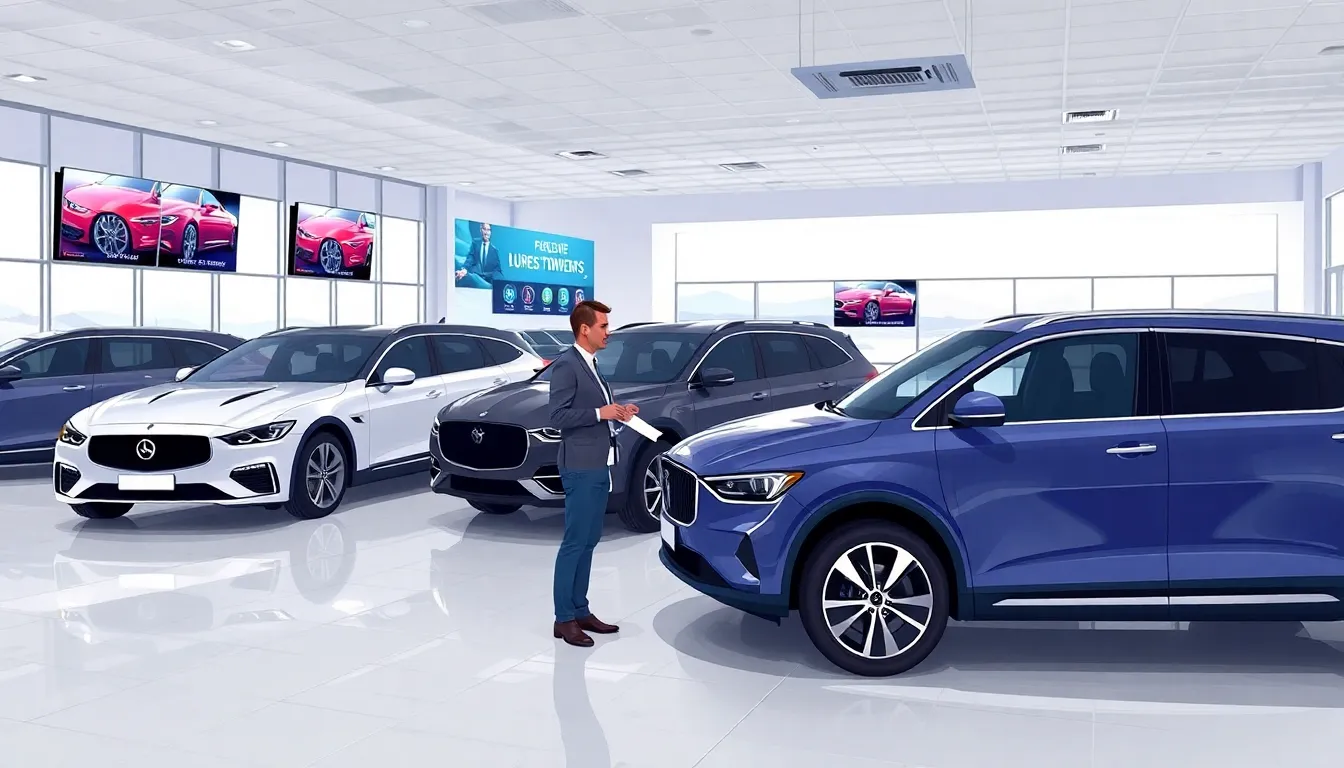The car dealership industry is shifting faster than a teenager on prom night. With new technologies and consumer preferences evolving at lightning speed, staying ahead of the curve is no longer just a luxury—it’s a necessity. From the rise of electric vehicles to the growing importance of online sales, dealerships must adapt or risk being left in the dust like last year’s model.
car dealership industry trends
The car dealership industry is witnessing transformative trends this year. Electric vehicle adoption surged, with over 6% of new vehicle sales in 2023 being electric. This shift influences dealerships to expand their electric vehicle inventories and upgrade charging infrastructure.
Furthermore, online sales have grown significantly. Approximately 40% of consumers prefer researching and purchasing vehicles online, prompting dealerships to enhance their digital presence. Online platforms facilitate seamless communication and transaction processes, making them crucial in attracting tech-savvy buyers.
Consumer preferences also shifted towards sustainable practices. Many buyers now seek eco-friendly options, pushing dealerships to promote hybrid and electric models more aggressively. Sustainability is becoming a selling point, impacting marketing strategies across the industry.
Another trend involves inventory management. Data-driven approaches enhance forecasting and stock management, helping dealerships reduce overhead costs by as much as 15%. Effective inventory control ensures that dealers meet consumer demand without overstocking or understocking vehicles.
Additionally, customer experience remains paramount. High-quality post-sale services, such as maintenance packages and loyalty programs, encourage repeat business. As a result, dealerships invest in training staff to improve customer interactions.
Lastly, automakers play a vital role in shaping dealership trends. Many are shifting towards direct-to-consumer sales models, challenging traditional dealership structures. Collaboration between manufacturers and dealerships is essential for adapting to these changes.
The car dealership industry is evolving rapidly. Adaptation to electric vehicles, enhancement of online sales, and prioritization of customer experiences underscore the industry’s future direction.
Impact of Technology on Dealerships

Technology plays a critical role in transforming the car dealership landscape. Dealerships need to embrace various tech advancements to stay competitive.
Digital Retailing and E-Commerce
Digital retailing reshapes how dealerships engage customers. Approximately 40% of consumers prefer researching and purchasing vehicles online. This shift compels dealerships to develop user-friendly websites and mobile platforms that facilitate seamless transactions. Dealerships can leverage e-commerce strategies to showcase inventory, offer virtual tours, and streamline financing options. Enhancing the digital experience elevates customer satisfaction and drives sales in an increasingly online market.
Use of Big Data and Analytics
Big data and analytics become essential tools for dealerships. Utilizing data not only informs inventory management but also enhances customer insights. Effective use of analytics can lead to a reduction in overhead costs by up to 15%. By analyzing sales trends and consumer preferences, dealerships optimize their stock and marketing efforts. Data-driven decisions foster efficiency and allow dealerships to tailor their approaches to meet the needs of customers within a dynamic marketplace.
Changing Consumer Preferences
Consumer preferences in the car dealership industry are evolving rapidly. Many buyers now prioritize electric vehicles and online shopping experiences.
Shift Towards Electric Vehicles
The shift towards electric vehicles dominates current market trends. Over 6% of new vehicle sales in 2023 represent electric models. Consumers increasingly seek eco-friendly options, which compels dealerships to expand their electric inventories. This expansion includes upgrading their charging infrastructure to accommodate a growing number of electric vehicle owners. Sales strategies must now prioritize these green alternatives to align with customer expectations.
Demand for Online Services and Transparency
Demand for online services continues to rise, with around 40% of consumers preferring to research and purchase vehicles digitally. Dealerships must enhance their digital presence to meet these expectations. Websites need user-friendly interfaces, facilitating vehicle searches and purchases. Transparency in pricing and inventory also plays a key role in attracting savvy consumers. Providing detailed information online builds trust and encourages engagement, essential for nurturing customer relationships in the digital age.
Economic Factors Influencing Dealerships
Economic factors significantly shape the landscape of the car dealership industry. Changes in financing, inventory management, and other economic conditions influence dealership operations and strategies.
Interest Rates and Financing Trends
Interest rates affect consumer purchasing power directly. Higher rates can lead to decreased demand as monthly payments increase, making vehicles less affordable for many buyers. Dealerships need to adjust their financing options to attract potential customers. Promotions on financing and incentives often become crucial tools during periods of rising rates. Keeping abreast of financing trends allows dealerships to offer competitive rates, which may increase sales.
Supply Chain Challenges and Inventory Management
Supply chain disruptions continue to challenge dealerships. Delays in vehicle production lead to reduced inventory levels, impacting sales potential. Many dealerships are now adopting data-driven inventory management practices to optimize stock levels. Effective management can reduce overhead costs and ensure popular models are always available. Adjustments to supply chains and smart inventory strategies become essential in maintaining a competitive edge. Prioritizing reliable suppliers and improving logistics can strengthen dealership operations amid these challenges.
Future Outlook for Car Dealerships
The car dealership industry faces significant transformations driven by technology and consumer preferences. Dealers must pursue strategic adjustments to thrive in this evolving landscape.
Predictions for Market Growth
Analysts expect the car dealership market to grow at a compound annual growth rate (CAGR) of 3% from 2023 to 2028. This growth aligns with increased demand for electric vehicles, which made up over 6% of new vehicle sales in 2023. Significant investments in marketing and sales are critical to attract eco-conscious consumers. Data suggests that dealerships emphasizing online transactions will enhance consumer engagement, catering to about 40% of buyers who prefer researching vehicles digitally. As traditional sales models face pressure, adapting to the direct-to-consumer sales approach may become pivotal for many dealerships.
Adaptations for Sustainability
Sustainable practices are becoming essential for long-term success in car dealerships. Expanding electric vehicle inventories and upgrading charging infrastructure demonstrates commitment to environmental responsibility. Adopting transparent pricing models helps foster trust in consumers seeking eco-friendly alternatives. Data-driven inventory management practices can enhance operational efficiency, reducing overhead costs by as much as 15%. By adapting marketing strategies and promoting high-quality post-sale services, dealerships can increase customer loyalty, leading to sustainable growth in a competitive market. Focusing on eco-friendly options aligns with shifting consumer preferences, ensuring dealerships remain relevant.
Conclusion
The car dealership industry is at a pivotal moment. As electric vehicles gain traction and consumer preferences shift towards online shopping, dealerships must embrace these changes to remain competitive. Investing in technology and enhancing digital platforms will be crucial for meeting customer demands and building trust.
Adopting sustainable practices and transparent pricing models will not only attract eco-conscious buyers but also position dealerships for long-term success. With the market projected to grow steadily in the coming years, those who adapt quickly to these trends will likely thrive. The future of the car dealership industry hinges on innovation and responsiveness to evolving consumer needs.

